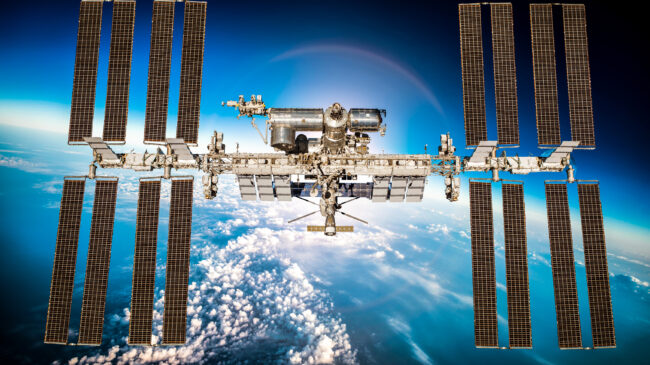President-elect Joe Biden will predictably distance himself from many of the Trump administration’s policies and positions, but its openness to commercial space partnerships should not be among them.
The expansion of public-private space partnerships that began during the Obama administration has continued during the Trump administration. These public-private partnerships have helped lead to many major space successes, including crewed-launches returning to American soil through SpaceX and the first-ever civilian passenger on a private suborbital spaceflight as part of Virgin Galactic’s 2019 VSS Unity SpaceShipTwo launch.
These successes, and others, reflect positively on the U.S. space sector. However, they would not have happened without the entrepreneurial nature of commercial space. Unlike government engineers and scientists, commercial space operations are not constrained by government bureaucracy nor reliant on taxpayer funding. This allows commercial space companies to explore some seemingly far-fetched ideas, like 3D printing of small rockets, a concept being pioneered by the small start-up Relativity.
Commercial space companies must also develop and maintain a competitive edge to survive in the market. Significant competition ultimately creates less-costly services that give NASA more bang for its buck when developing new technology. Competitive market pressures have created inspiring innovation exemplified by SpaceX’s reusable rocket technology and proposals for recycling and turning discarded orbiting tanks into space stations.
Without the federal government’s continued openness to commercial space, innovation, and invention in the U.S. space industry could be stifled. Commercial space continues to show up when the government needs new services. Over the last few years, we have seen amazing new technologies developed to track environmental and climate concerns. This is, in part, because NASA has entered into deals with private companies like Planet that are able to analyze data collected by satellite imagery. Planet has stakes in defense satellite imagery but has expanded its portfolio to collect data for climate scientists and researchers to use. Its constellation of 120 satellites is at work photographing every portion of the world at least once a day, which provides constant and up-to-date environmental information.
By maintaining deals like that with commercial satellite companies, NASA can avoid the costs of creating its own satellite constellation and other remote sensing technology. Additionally, NASA does not need to focus its energies on updating technologies to keep up with new software and technological capabilities.
Companies that worry about competition in the market naturally reassess their services and the burden of doing this should be put on private industry, not on the government. Biden’s team should seek out the most effective private partners, hiring new talent in civil programs to use these systems. This would also free up funding for crewed space exploration.
In addition to looking to develop new partnerships for space-related efforts, a Biden administration should reassess the government’s old partnerships.
Prior to the election, Reuters reported that some Biden associates believe he may try to continue funding the International Space Station (ISS) beyond its planned termination in 2025. Reuters reported:
…Biden, on the other hand, would likely call for a delayed moonshot and propose a funding extension for the International Space Station if he wins the White House, according to people familiar with the fledging Biden space agenda.Pushing back the moon mission could cast more doubt on the long-term fate of Boeing Co’s Space Launch System (SLS) rocket, just as Elon Musk’s SpaceX and Jeff Bezos’ Blue Origin scramble to bring rival rockets to market as soon as next year.
Extending support for the space station for a decade would also be a major boost for Boeing, whose $225 million annual ISS operations contract is set to expire in 2024 and is at the depths of a financial crisis caused by the COVID-19 pandemic and the 737 MAX grounding after fatal crashes.
This directly contradicts the Trump administration’s efforts to cease funding for the archaic space station by 2025. If Biden were to continue funding this aging facility via NASA it would drain funds that could be used for more important space activities, including manned missions. Commercial companies are primed and ready to take over the space station’s functions, and NASA should allow them to do so.
If Biden has taxpayers and NASA continue to fund the ISS, it would most likely continue to contract with a company that famous for draining government money—Boeing. The partnerships with Boeing are the types of space policies the incoming Biden administration should be reviewing. It should ask Congress for a Government Accountability Office audit of Boeing’s work on the Space Launch System (SLS). The contract is for the development of a rocket with heavy-lift capacities that is designed to bring humans and cargo to the moon and back. Unfortunately, it has had numerous delays and cost overruns and is still not ready for a test flight, as Bloomberg reported in August:
Boeing Co.’s Space Launch System, the largest rocket in NASA’s history, will carry a price tag of at least $9.1 billion — or 30% more than the previous estimate for a key element in the agency’s plan to return to the moon.
Additionally, the costs for new ground infrastructure at Florida’s Kennedy Space Center to support the deep-space exploration program has jumped to $2.4 billion, Kathy Lueders, NASA’s associate administrator for human spaceflight, said in a blog post Wednesday. That’s also a 30% increase, the National Aeronautics and Space Administration said in an email Thursday.
While we wait for Boeing to reuse obsolete space shuttle hardware on SLS, companies like Blue Origin and SpaceX are continually reusing entire launch boosters. Biden’s administration needs a real review of whether it would be more cost and time effective to work with companies like SpaceX or Blue Origin. SLS is estimated to cost NASA $1 billion or more for each launch, after having already consumed $18.3 billion since 2010. By contrast, SpaceX has had its self-funded heavy-lift rocket Starship in development since 2012 and has been doing successful prototype tests since 2019.
Another space entity that will be a key issue for the Biden administration is the military agency, U.S. Space Force, created by President Trump. Reason magazine had detailed the numerous reasons a Space Force should not have been created. Now that it does exist, the Space Force should be viewed as an agency that does not need to spend taxpayers’ money to create its own technology for its missions. Instead, it should use the readily available market of commercial partners ready to contract services.
Space News recently reported that Space Force is just now learning of the private sector’s capabilities:
[Gen. John “Jay”] Raymond said in years past the only commercially viable services have been space launch and communications provided by geosynchronous satellites. But the Space Force is now becoming aware of other capabilities that are being offered commercially such as space tracking data, weather data and on-orbit satellite servicing.
Raymond, chief of operations for Space Force, has previously committed to working closely with commercial satellite companies for space-related missions. Col. Michael “Hopper” Hopkins, commander of NASA’s SpaceX Crew-1 mission, was commissioned into the Space Force and began a new line of Space Force officers expected to launch to the ISS.
To facilitate continued partnerships between Space Force and private enterprise, the Biden administration could back an initiative currently proposed to Congress that Space Force acquisitions be “speedy and agile.” Flexibility for Space Force would include pushing acquisition power to the lowest level of management and removing bureaucracy to make its programs more efficient.
We are at a pivotal moment in the space industry’s history. The federal government has the opportunity to partner with space industry innovators like Elon Musk, Jeff Bezos, and Richard Branson, and ensure there’s the opportunity for new space startups to emerge and add value to the market.
The other path, a government and NASA-centric approach to space, would likely stifle technological developments and breakthroughs by private companies, cost taxpayers a lot more money, and cause the United States to fall behind other nations in a number of key areas.

